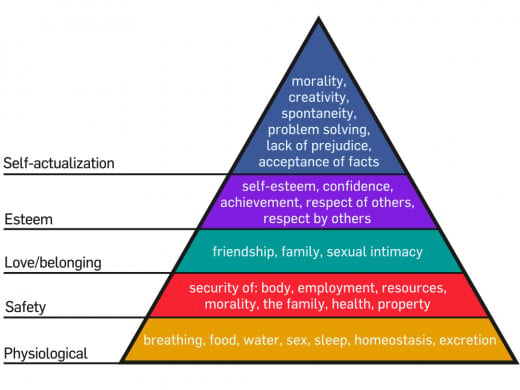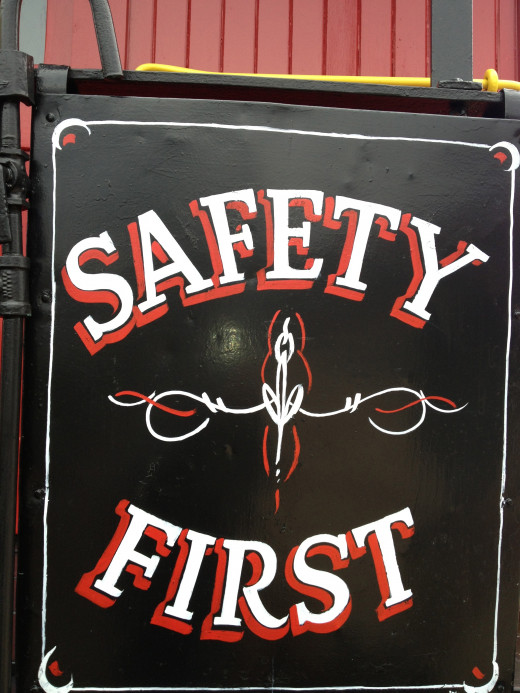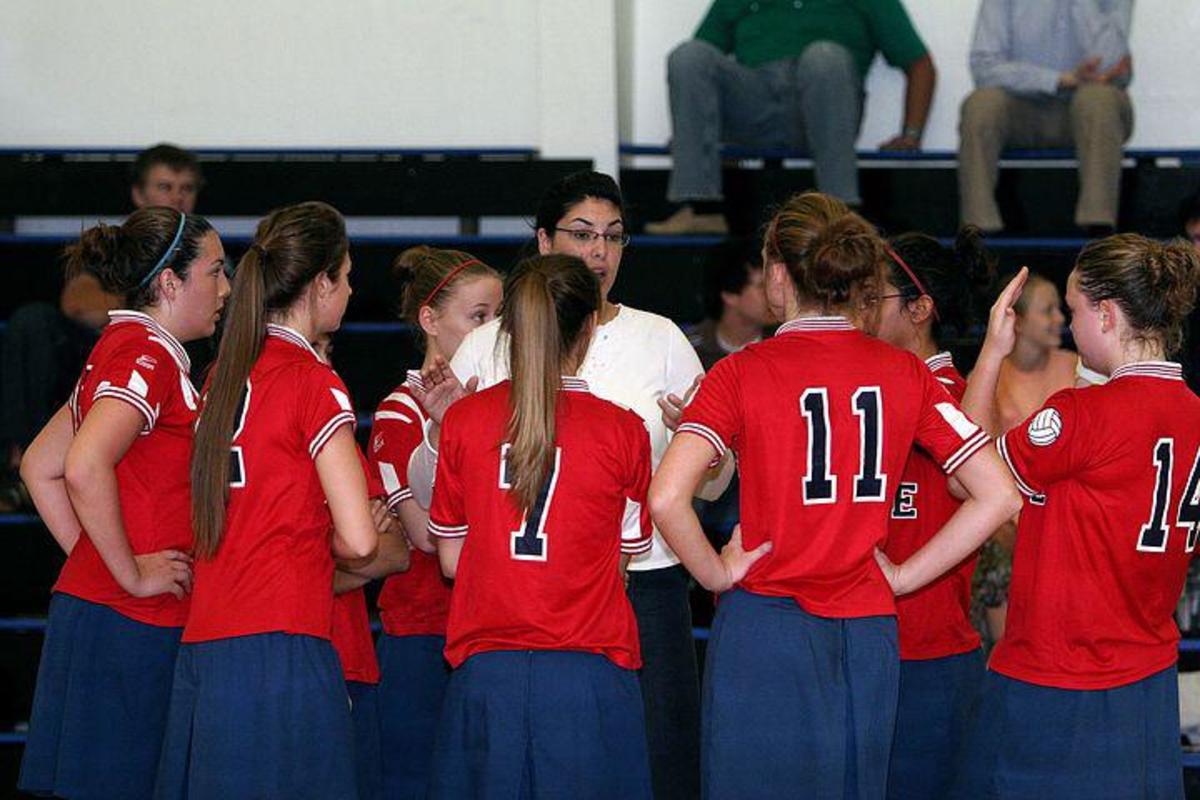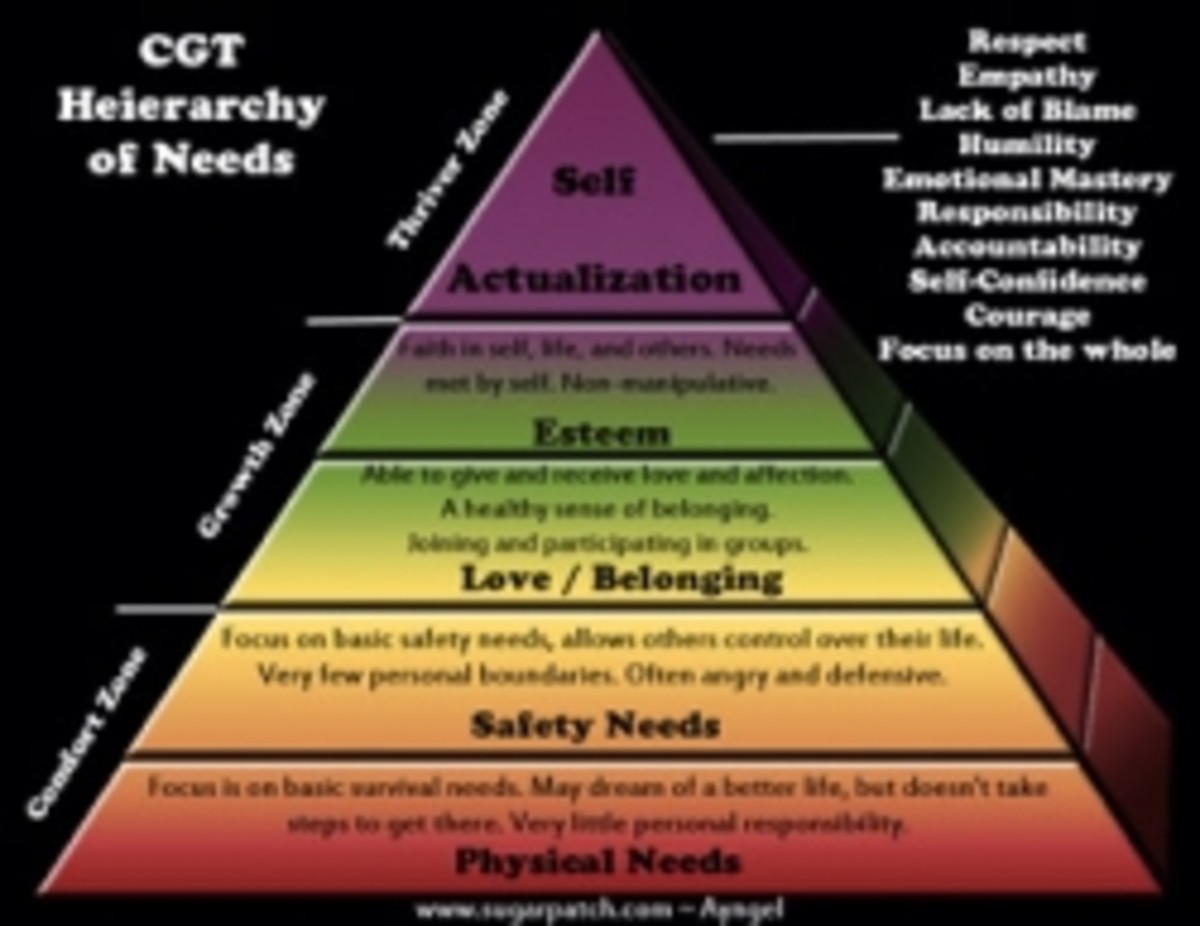A Reason for Writing at an Internet Site
The Hierarchy of Needs contributed by Wafiy Akmal, (Nov. 2013)
Do Internet Authors Experience Transcendence at Writing Sites?
As authors and writers, which are two distinctive traits and qualities of the field of writing, become members of a writing site do they have the opportunity to experience transcendence? Transcendence simply means to have existence beyond the normal or physical level. Does that mean it is a spiritual experience? Could it mean an evolving experience? This author is not sure, yet is willing to discover, explore, and share.
We know what transcendence basically is and we know what each of us is seeking to do with writing an internet article. Why yes, communicate something in some manner. Does motivation occur at a writing site? Most certainly yes that occurs. We strive to write something with the hope of being read by others while each of us has our own unique reasons why. Basic motivation says we simply desire to do something or things. When an individual acts upon stimuli to receive a reward a behavior is formed.
Stimuli → Motivation → Action → Act → Reward
Once one article has been written, published, and read then that process has occurred. Applying the quality of transcendence all one needs to do to transcend is do something else. Internet writing sites offer this through many means or methods. Firstly, write another article, publish, and experience it being read. However, most if not all writing sites offer the luxury of transcendence with privilege as members through
- Social interactions – commenting
- Offering a review status with an accolade or similar device for appraisal
- Other opportunities such as HubPages, Squidoo, Wizzley, and others offer with forums
- Hubpages also offers a question section offering opportunity to interact with answers

Maslow’s Hierarchy of Needs or Deficiencies
Best known for creating a symbolic pyramid – Maslow’s Hierarchy of Needs or Deficiencies, Abraham Maslow (1908 – 1970) was a humanist and prolific psychologist. His career life as a psychologist, researcher, and professor offered to him teaching positions at distinguished learning institutions beginning the year 1937 at Brooklyn College.
He also taught at Brandeis University, New School for Social Research, and Columbia University. His greatest work as an experimental psychologist and researcher is his humanist approach to “Self Actualization.” He openly questioned, "Why don't more people self-actualize if their basic needs are met? How can we humanistically understand the problem of evil?"
His continued research led to what has been used with both individual psychology and social psychology - the Motivation Model of Self-Actualization or Maslow’s Pyramid of Needs and Deficiencies. Its application has been extensively used with individuals of all walks of life, group dynamics, business, education, and more. The premise of this theory is that there are levels of needs we transcend toward self-actualization while fulfilling those needs one level at a time. However, moving through those levels will be a constant while seeking self-actualization. As or when each lower level’s needs are met or stabilized transcendence to the next level of needs may occur or has capacity to occur.
Following next is that symbolic representation of his development. A moment or two of examination with thought will offer a better understanding and help with the purpose of this internet article. Below that are several links to his theory and theory usage in today’s societies.
Abraham Maslow's Basic Pyramid of Hierarchy of Needs

What is Self-Actualization?
Although used in psychology in different manners by researchers and theorists self-actualization in essence is the result of the motive of an individual [Entity, Organism, Organization, and etc.] to become or realize its fullest potential. We have discovered that desire to do something is motivation. We have motive. The action, the behavior, resulting from that motive leads to a reward. In theory that reward is self-actualization. Some speculate even farther back is inspiration – psychological or physiological, social or individual, human or divine, and etc.
Significant persons of this concept of study and practice began in modern thought with organismic theorist Kurt Goldstein (1934, November 6, 1878 – September 19, 1965). His holistic approach was based on Gestalt Theory and influenced Gestalt therapy.
Another influential psychologist developing self-actualization is Carl Rogers (January 8, 1902 – February 4, 1987). His contribution centered upon the humanistic approach like Abraham Maslow. Focusing on the person centered approach of psychology and therapy he wrote of "the curative force in psychotherapy - man's tendency to actualize himself, to become his potentialities... to express and activate all the capacities of the organism." Again, the third key person of self-actualization was Abraham Maslow.
Applying Maslow’s Hierarchy of Needs with Internet Writers and Authors
Examining the core of Maslow’s Theory of Needs, having perspective with motivation, and perceiving behavior we may have a recipe offering success of transcending. Hopefully that process leads upward toward self-actualization.
When an internet writer or author decides to write something they are motivated. Usually that something has meaning for – the writer, the author, the audience, and the readership? Those will have importance as we walk together upward through Maslow’s Hierarchy of Needs or Deficiencies.
Here we are going to look at applying Maslow’s concept initially with the writing process occurring at the safety level. (A brief look at the first tier will follow.) We may make the leap that employment means with sociology the master status now undertaken as a writer or author. We employ ourselves as a writer firstly seeking the reward of achievement and/or accomplishment of the task. Employ means to give work to someone for pay. Pay means to receive a return for a service rendered. Generally most see this as a financial reward, yet we do receive a psychological benefit or pay too. So, essentially once the article is read a payment is received. This fulfills the requirements for being employed – self-employed.

Level Two – Safety provides the Environment for the Employed Writer / Author
His concept emphasized the security of employment. In the example above an internet writer at any place of publication acquires that. Are the other needs met? Let’s look a little more closely. The basic pyramid shares the second level – Safety, is security of:
- Body – to answer this one must reasonably ask, “Can physical harm result with writing at an internet site?” Most will likely say no.
- Employment – This has been discussed above
- Resources – Since we are writing at an internet site we have metaphorically infinite resources to complete that task. Browsers and web articles range through any age grouping, education level, profession, and well, almost all interests. Plus, the writing site itself offers resources “how to” do the process as well as act upon various opportunities – self learning, social interactions, group formation, and even venturing outside to other opportunities, i.e. blogging, websites, freelance, and more.
- Morality – Even though internet writing sites may have a general lean – political, religion, and etc., morality, and ethics are apparent with the Terms of Service (TOS). Distinctions with morality within the confines of the TOS offers safety and too liberty of choice. One may join or create circles of social interactions tailoring their preferences for morality and those philosophies or religions they are developed from.
- Family - The concept of family is “regarded as a major social institution and a locus of much of a person's social activity.” The most accepted definition for family is the immediate family both lived while growing up, presently in household, and social interaction with blood relatives. Both of those may easily be met as a writer or author at an internet writing site, while generally no harm is presented to the security of that status.
- Health – Even though today’s modern thought has migrated toward the concept of wellness and its integral parts (For interest easily follow this link to the National Wellness Institute) we may answer this with Health is not threatened, therefore has a state of safety surrounding it. There are the exceptions of mental or emotional health/wellness since it is mental or cognitive activity, however as an adult site personal cognize must be considered.
- Property – The TOS of the internet sites do have distinctions of copyright regarding intellectual property rights at times, yet generally speaking the copyright of intellectual property is owned by a writer or author. Therefore, security of property does exist, [baring criminal acts, which do exist in any society].
Did We Meet the First Level Needs? Does that Affect the Second Level?
However, did we firstly fulfill the first level before entering upon the second level. As an individual or organizationally if we do not fulfill the lower level will that individual have actually transcended to the next level? Most likely that shall be answered by each unique individual with their own sense of values and worth. For now let’s briefly review the first level seeking personal answers presenting opportunity for learning. In essence are you meeting these biological needs . . .?
Obviously we must be breathing when we are writing, even though some may have challenges, e.g. asthma, bronchitis, or even smoking. How many writers or authors haven’t eaten while writing? Most internet writers or authors do have meals as a generality, so need of food is fulfilled. Water usually is available, although quality or source will vary. We may make the leap that a soda, juice, tea, coffee, beer, and etc. will fit this bill while for some a real necessity (where’s my coffee cup).
Sex is an oddity some may ponder as a need. Since it is used here within psychology most likely as adults this need is met in some manner, (for more information of Sex as psychological, biological, and a social term see this link). Yes, implications of debate with philosophy, religion, social, political, and etc. may exist. This author offers the position as this pyramid is seeking the individual first, then each individual would best ask of “Self” seeking their “own” answer.
Sleep would seem as a given as we most meet that need in some manner. Even though frequency and length may vary for a writer or author affecting efficiency, cognition, and creativity. To accomplish the task of writing sleep must take place. Homeostasis says simply regulating and balancing these parts of the first level needs to occur. The last is excretion and most know will occur with food and water unless there is a medical or health / wellness cause.
Franciszek Zmurko - In delightful dream

Will Transcendence Occur Leading toward Self-Actualization
With the review of the first two levels of Maslow’s theory as the model for seeking Self-Actualization one concludes the premise presented is met. Yes, if the first level needs are met and the next acted upon with these;
- The internet writer / author has a means via PC or Laptop
- Does have internet access
- Is a member of an internet writing site
- Writes at least one article or socially interacts, e.g. comments
Then certainly it appears transcendence does lead toward self-actualization. Quite simply that writer or author has transcended from level one to level two. And there are more opportunities ahead seeking self-actualization.
Tomorrow
The future beyond levels one and two are shown with the image of symbolic pyramid. As those are visited and evaluated by an individual’s sensibilities, values, and worth the pathway becomes clearer toward self-actualization. We will adapt as well as create within life on that journey. After all writing and authoring is a creative process. Just like a painter creating paintings seeking her/his own masterpiece(s) representing their own self-actualization with transcendence a writer or author diligently strives with the means available to achieve, to rise upward, and to become.
There are three more levels to master as a writer or author at an internet writing site. Those are:
- Love and Belonging – Friendship, Family, and Sexual Intimacy
- Esteem – Self Esteem, Confidence, Achievement, Respect of Others, Respect by Others
- Self-Actualization – Morality, Creativity, Spontaneity, Problem Solving, Lack of Prejudice, Acceptance of Facts
Peering upon Learning and Writing

With research and study one may discover Maslow himself did transcend seeking Self-Actualization with his very own model. Later, with further research, theorizing, and verification he changed his model (1970). He expanded it with three more levels while delineating some of the other levels with closer acuity. Today, his model follows along with:
- Biological and Physiological needs - air, food, drink, shelter, warmth, sex, sleep, etc.
- Safety needs - protection from elements, security, order, law, limits, stability, etc.
- Social Needs (Once labeled Belonging) - Belongingness and Love, - work group, family, affection, relationships, etc.
- Esteem needs - self-esteem, achievement, mastery, independence, status, dominance, prestige, managerial responsibility, etc.
- Cognitive needs - knowledge, meaning, etc.
- Aesthetic needs - appreciation and search for beauty, balance, form, etc.
- Self-Actualization needs - realizing personal potential, self-fulfillment, seeking personal growth and peak experiences.
- Transcendence needs - helping others to achieve self-actualization.
This alone demonstrates his principal and theory. We discover as we seek Self-Actualization change will occur as it is inevitable. Most, this author believes, hopes and act seeking self-actualization. The new model pinnacle for the symbolic representation as a pyramid offers that hope at both the individual and social levels – helping others to achieve . . .
© 2014 Tim Mitchell








